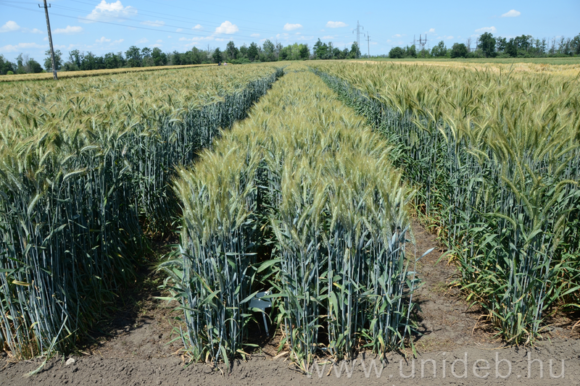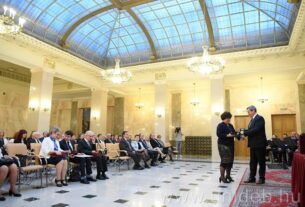Westsik’s crop rotation, developed at the Nyíregyháza Research Institute of the University of Debrecen in 1929, offers a solution to improve sandy soils. At a conference held to commemorate the 90th anniversary of the institute, researchers from 7 countries discussed the long-term field experiment.
The long-term crop-rotating field experiment named after Vilmos Westsik, the “father of sand improvement”, conducted at the research institute in Nyíregyháza, is unique in Europe. Its primary aim is to improve the fertility of sandy soils. To this day, they use the same natural sources of organic matter (straw, farmyard and green manure) for the improvement of the soil that were originally used in the 1930s.
“The timeliness of these is indicated by the fact that they count as fundamental methods of environmentally conscious nutrient supply, which are increasingly in the foreground in recent years. The value of the crop rotation system is also enhanced by the fact that this is one of Europe’s oldest long-term field experiments maintained in an unchanged form,” said László Zsombik, director of the Nyíregyháza Research Institute of the Centre for Agricultural and Applied Economic Sciences of the University of Debrecen.
The crop rotation experiment provides an opportunity for the examination of the organic matter turnover in the soil. They examine the direct and indirect effects of 15 methods of nutrient supply in rye, potato, white lupine and common vetch cultures. In a parallel way, they also examine the physical, chemical and microbiological properties of the soil, which serves as the foundation for soil chemical, biological and physical research.
Long-term field experiments are also conducted in the framework of the university’s agricultural research projects in Debrecen, at the Hajdúböszörmény and Látókép farms. The soil cultivation experiment, started in 1989, which is unique in Europe, has contributed to the development of modern soil use and precision production technologies, as well as the identification of the effect and interface of the technological elements.
“The results of the long-term field experiment on water and nutrient turnover helps us in gaining a better understanding of the physiological how species of different genotypes are sensitive to climates and adapt to the growing conditions, in the determination of the changes in the photosynthesis performance of field crops, the measurement of the water consumption of plants, the description of the processes in the plant-soil-atmosphere system, and the development of agro-economic models. Further, it also helps corn producers in choosing the most suitable hybrids, and thereby contributes to environmentally conscious, efficient and effective corn production,” added János Nagy, professor at the Institute of Land Use,Technology and Regional Development of the Faculty of Agricultural and Food Sciences and Environmental Management.
In the long-term field experiments of the Institute of Crop Sciences, lasting 30 to 50 years, the most important elements of field crop production from the point of view of production in terms of volume, safety and quality are examined.
“In addition to the agronomical value of the long-term field experiments, those objectives are brought to the foreground which aim at the solution of challenges in the environmental, climate change, nature conservation and other interdisciplinary areas. The approach is increasingly multidisciplinary, and the crop science research is supplemented with such other disciplines (pedology, agrochemistry, botany, plant physiology, plant protection, etc.) with the involvement of which we can gain a better understanding of the processes of material and energy turnovers in the soil-plant-atmosphere system, and thus improve the agronomical and economical efficiency of plant production in Hungary.
We can safely say, therefore, that the long-term field experiments of plant production represent a national treasure, the maintenance of which is also justified in the future and represents a unique value,” said professor Péter Pepó, director of the Institute of Crop Sciences. The results and the research background of the long-term field experiments were discussed by experts from Norway, Italy, Ukraine, India, Romania and Slovakia, in addition to the Hungarian hosts, on 27 and 28 September, in Nyíregyháza, at the international conference organised to commemorate the 90th anniversary of the foundation of the research institute.
Press Office, unideb.hu



















